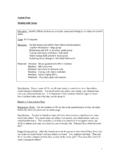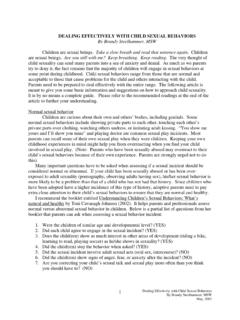Transcription of DEALING WITH CULTURAL DIFFERENCES: Contrasting the …
1 DEALING with CULTURAL differences : Contrasting the African and European WorldviewsBy Orville Boyd JenkinsOriginally published asDealing with differences : Contrasting the African and European Worldviews, 1991 Communication Press, Limuru, KenyaThis version 28 November 2007 Copyright 1991, 2007 Orville Boyd JenkinsINTRODUCTIONThe material in this book is a summary drawn from several years of study and experience in EastAfrica. I hope it will help people from a European CULTURAL background to learn about Africa. Itmay help those living in Africa or planning to live in Africa to adapt to that CULTURAL backgroundmore of the material has been used in culture-study sessions in Kenya for missionaries planningto work in East Africa with various church groups. The material has also been used in otherpublic presentations on the contrast between African and European ("Western") focus of the book is on East Africa, and particularly Kenya, where the author lived andworked for ab out 25 years.
2 Extensive contact in many African countries and several Africancultures and languages provide a comparative reference base for this topic. Most of theobservations and comparisons with European culture will apply to Africa as a whole. At least itshould give a basis for critical comparison. The broad outline of worldview contrasts will applyto most Asian and indigenous American is a large place with varied peoples and innumerable CULTURAL and linguistic variations. One always runs a risk in making generalizations. I hope readers will use this book as a guide tomake their own observations and comparisons, based on their own experience in the specific areaof Africa where they have tried to summarize a basic contrast of the African way of organizing reality and theEuropean way of organizing reality. Perhaps the contents and perspectives herein will helpforeigners in Africa to identify possible areas of conflict, to recognize such conflicts when they begin to arise, to accept as natural occurrences the difficulties they have as foreigners, to accept them in a positive manner and work through them, to try to develop a positive appreciation of the reasons in African culture for thedifferences, and finally DEALING with differences page 3 Orville Boyd Jenkins to change enough to fit in with the African situation and work within the terms of thedifferences which exist.
3 While the book is written for the European coming to Africa, it should also be helpful forAfricans wanting to better understand people of European background. Africans may understandbetter why Europeans act in such strange ways, and why they sometimes have such difficultiesfitting into the may further learn how to help Europeans living in their countries if they understand theEuropean CULTURAL background and some of the problems this causes Europeans in of all I hope it can help to smooth some of the tensions that arise at times betweenChristians of European and African background working together in an African setting. Manytimes neither side knows why the difficulties are stemming from differences in culture, ways of thinking, or previous experience may bewrongly attributed to unchristian attitudes, insincerity, deceit or other moral defects. If werealize the differences , perhaps we can deal with them.
4 Perhaps this book can be of help in"peacemaking" through with differences page 4 Orville Boyd JenkinsChapter OneCULTURE SHOCKIt is difficult to move from one CULTURAL group or region of the world to another. Most peoplehave heard the term "culture shock." This involves more than adjustment to different types ofhouses and whole pattern of organization of the new place may be totally different from one's homeculture. differences may be small, at first, but many. One may experience many smallirritations, sometimes unidentifiable, and these build up. Finally the irritations and disorientationbuild up to a breaking may result in depression, anger, criticism. Some resort to overwork to avoid contact withpeople. Others schedule administrative work instead of field work for the same develop symptoms of general lethargy or hyperactivity, depending on the individual andmultiple other factors.
5 Some have nervous breakdowns. Some develop ulcers or other develop symptoms of various exotic diseases, but no physical signs can be detected bymedical tests. Some become critical of the nationals, or of different things in the new become irritable towards a Christian experiences such a reaction, he or she may identify the problem as a "spiritual"one. Not praying enough, not studying the Bible enough, not serious enough about mydedication, some unconfessed sin in my Normal OccurrenceBut it is only culture shock a normal occurrence when entering a new culture. (It may not even"set in" for weeks or months after initial entry.) Many Americans even experience culture shockmoving from one region of the greatly varied United States to another. When one moves to a new part of the world, one actually has to go through a total reorientationof personality, thought and life-style. Most people who experience severe culture shock do sobecause they do not know to expect it, or they do not know how it may most insidious aspect is that the person many times cannot identify the problem.
6 Specificproblems are seen and focused on, but may not be the real problem. (Part of the problem ofculture shock is that you often do not know you are having culture shock.) DEALING with differences page 5 Orville Boyd JenkinsConsider the period of language study which missionaries and other long-term workers in aforeign country must go through. When they first enter the country, the largest part of their timeand their main efforts go into studying the , they are also learning to deal with the living situation. New schools for the children,different places and ways to shop, different types of foods or ways of packaging them, a newcurrency. There are banks, but they have totally different procedures, and each person you ask gives youdifferent information or instructions. When taking new families to open an account, it has been acommon experience to find the requirements or procedures change every there are customs and immigration matters like alien registration.
7 Visitors may receive oneset of instructions from the people in the government office in the capital city, and another at aborder checkpoint. Often these matters must be handled in the foreign language which theperson has not yet mastered, often without adequate support and help from language centre, the teacher-facilitator or the company supervisor may become theimmediate focus of discontent. The specific reason for irritation or dissatisfaction cannot beidentified. But since the most prominent thing in life at that time is language study, that becomesthe focus of attention and the target for the release of language student may feel that if the schedule were just changed, if the teacher's method oftesting were changed, if the pace were slowed or speeded up then everything would be fine. But then if changes are made, the irritation still remains, and other matters are identified as the"cause" of the disorientation: problems with the language study, with the living situation, withthe mission administration, with the nationals' attitudes, the problem is simply the disorientation itself.
8 Culture shock is the term for the general,often undefined, sense of disorientation resulting from the buildup of many small adjustments,which often in themselves might be considered accumulation of experiences and social challenges causes the feeling that the individual isnot in control. There is a constant feeling of uncertainty, the person may feel insecure oranxious. Stress are new, and often unclear, role expectations, procedures which local people assume thenew arrival should know. Procedures may change without notice and without any stated with differences page 6 Orville Boyd JenkinsFor instance, one day I took an application to Kenya Immigrations for a Pupil's Pass for a newlanguage learner who was coming to our program. The clerk asked me where the personal coverletter was. That was the first I had heard of InformationI asked what the letter was supposed to say.
9 It was supposed to give the same informationalready on the form letter, of which two copies were already asked when this requirement had been set, and was told it had been in force the past seven yearsthat the clerk had been working there. I had never been required to submit such a letter duringthe eight years that I had been submitting such applications. (Also, during all that time this wasthe first time I had ever seen that particular clerk.) Originally, one copy of the form letter application had been required, then about two years beforethat particular day, a second copy of the application form had been required, and then anadditional letter with the same information. (I was wondering, what do they do with all thatpaper?)Being HumanHow does one deal with such frustrations? They may continue to occur, since some aspects ofthe society and its organization may continue to be unclear to the newcomer, even after years ofexperience and if a person were better prepared to know what kinds of differences to expect, or tounderstand the foundation for the differences in the new society, it would be easier to accept thefeeling of disorientation, inadequacy, and uncertainty, and to deal with the situationconstructively and as a learning are all products of the cultures in which we grew up.
10 This is neither good nor bad it issimply a basic component of being human. We have to learn how to be human in some way. The problem is in how we look at the other ways to also "be human." We can learn to deal withthe differences if we with differences page 7 Orville Boyd JenkinsChapter TwoDIFFERENCESThe anecdotes related here will illustrate areas of differences between the European and theAfrican points of view. These incidents will provide a perspective on areas of differences whichmay cause conflicts. Then an attempt will be made in the following chapter to draw a systematiccomparison of the two CULTURAL TeaAn American acquaintance of mine in Mombasa related the following incident to me. On oneoccasion a certain grocery store in Mombasa received a shipment of imported American instanttea, a delicacy for the American residents of Kenya.






